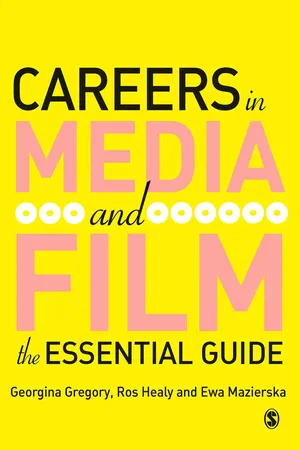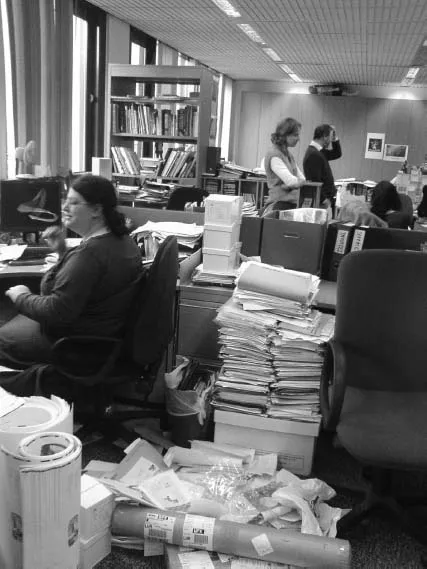
This is a test
- 224 pages
- English
- ePUB (mobile friendly)
- Available on iOS & Android
eBook - ePub
Book details
Book preview
Table of contents
Citations
About This Book
Written for students, graduates and academics from the disciplines of film, media and related subjects, and for those from other disciplines who want to break into the media, this book is a virtual career coach and an employability course all in one package. A practical handbook, it offers encouragement, advice, information and case studies to help students to make the most of the opportunities in this very competitive career world. The book can be used as a textual support for careers modules and PDP (Personal Development Planning), graduate workshops, on-line courses and as a departmental or careers library resource. Equally, it works effectively as a self-help guide to enable individuals to focus on their career / life development.
Frequently asked questions
At the moment all of our mobile-responsive ePub books are available to download via the app. Most of our PDFs are also available to download and we're working on making the final remaining ones downloadable now. Learn more here.
Both plans give you full access to the library and all of Perlego’s features. The only differences are the price and subscription period: With the annual plan you’ll save around 30% compared to 12 months on the monthly plan.
We are an online textbook subscription service, where you can get access to an entire online library for less than the price of a single book per month. With over 1 million books across 1000+ topics, we’ve got you covered! Learn more here.
Look out for the read-aloud symbol on your next book to see if you can listen to it. The read-aloud tool reads text aloud for you, highlighting the text as it is being read. You can pause it, speed it up and slow it down. Learn more here.
Yes, you can access Careers in Media and Film by Georgina Gregory,Ros Healy,Ewa Mazierska in PDF and/or ePUB format, as well as other popular books in Languages & Linguistics & Communication Studies. We have over one million books available in our catalogue for you to explore.
Information
PART I
Preparing for the journey: advice and information to get you started
Welcome to Part I of Careers in Media and Film. Here you will find plenty of general advice and information about the opportunities available to you in this exciting sector of work. You can find out about trends in the different industries connected with media and film, learn what employers are looking for and how you can best prepare yourself for successful application. You can find out how to network and how to forge the contacts which are so vital in these professions. You will also be invited to explore the benefits and rewards of getting work experience and how to get the most out of it. This will give you lots to write about on applications and to talk about at interview, covered at the end of Part I.
ONE | Prospects in the industry |
By the end of this chapter you will know more about:
- Trends in the media industries and how these relate to your career plan
- The culture and workforce in the media, film and broadcasting
- How recent graduates have successfully started careers in the media
This chapter explores how you might begin looking for employment within the audio-visual media industries. We look first at the pros and cons of having a qualification in a subject allied to media and whether or not this provides an advantage over degrees and diplomas in other less-closely related subject areas. This is followed by information on general trends and opportunities across the sector as well as some more specific data regarding employment in film, television and radio. The information here is by no means exhaustive so you should also research some of the industry specific literature already available. The aim here is to give you some insights into general trends across the sector. More detailed information and advice can be obtained by consulting the Appendix. In addition to facts and figures about the kinds of people who currently work in the media, the chapter presents case studies of real people, recent graduates who have stepped on to the first rung of the career ladder. They share their experience and knowledge with you and give you a few tips on how to break in at entry level.
Qualifications – have I chosen the right degree?
If you are a student on a media, communications or film studies programme, you may be concerned about your future employment prospects. Media studies in particular has suffered from a lack of recognition within traditional academic circles. This has, in turn, led to some negative press coverage of both media degrees and the subject media studies. In part, this is because the subject is relatively new and, amongst other things, it looks at aspects of popular culture such as celebrities, pop music and computer games. Critics cast doubt on the value of studying the disposable products of consumer culture and, by association, they doubt the abilities of media studies graduates. You will be glad to know is that this kind of thinking is not based on any genuine research. The good news is that the critics are ill informed.
In 2003, the Vice-Chancellor of City of London University said that ‘Employment levels for media studies looked better than those for physics’ (Observer, 17 August 2003). The research carried out on the employability of media graduates backs this up, showing very clearly, that media students are, in fact, highly employable. Indeed, they have been ranked within the top five subject areas for their employability by the Association of Graduate Careers Advisory Services (AGCAS, 2001).
This is not surprising. We live in an image-saturated world where visual literacy and an awareness of popular culture, media and film are an asset for those seeking employment in a whole range of careers. Television producers, film and advertising agency directors alike recognise that young people in particular are very knowledgeable about, and interested in, popular media. Moreover, production work is no longer confined solely to the media industries. Beyond the celebrity magazine offices and television studios in London, companies throughout the UK are making use of marketing, public relations and website activities. An up-to-date awareness of media texts and strong visual and analytical skills will also be welcome in many other enterprises. These skills are also a valuable asset to the growing number of graduates who choose self-employment at some stage in their career.
If you did not study film or media, you may have different concerns regarding your prospects of finding employment within the audiovisual industries. You may believe that you lack the very qualification which could secure you a position in television, radio, film or new media. A recent Skillset report (2004) states that only 25 per cent of those working in freelance positions within the audio-visual industries have a media degree. Employers are keen to recruit graduates from a whole range of disciplines, and specialist knowledge or enthusiasm for an unusual subject can be a tremendous asset. So, regardless of whether or not you have a media qualification, the potential for finding employment in this field is good and, if you are prepared to be flexible and find some work experience, prospects are very good indeed!
Should I go for a postgraduate qualification?
You may be considering the option of undertaking further study. If so, you need to give this very careful thought because studying at postgraduate level is very demanding and can be expensive. Begin first by questioning your motivation to continue studying. Is it because you want to continue exploring a subject you love? Is it a desire to improve your chances of securing employment or to obtain an essential professional qualification? Perhaps it is a mixture of these motivations. Let’s deal with these one at a time:

Most media offices are hives of activity all day
- To continue studying your subject?
If you wish to study for another two or more years because you love the subject and can afford to do so, then go ahead. Studying a subject in depth and being free to enjoy a passion for learning are excellent experiences. There is a lot to be said for the subject knowledge and extra maturity you will be able to bring to your future career. - To enhance your job prospects?
If you believe that further study will improve your chances of securing employment, exercise a little caution. For example, you may want to become a journalist or work in public relations and this has led you to believe that an extra qualification will make you stand out from the crowd and be a more attractive proposition to an employer. Bear in mind, though, that there are employers who will take on graduates who have no postgraduate qualification. These employers would prefer to see some evidence of your potential to carry out the job and they will look at what level of skill you have to offer. They could also be interested in your potential to learn how to do the job by being trained whilst at work. Taking this into account, a postgraduate qualification may not be absolutely essential. Work experience may be a more valuable option to consider. - To gain professional qualifications?
You may believe you need a professional qualification to pursue your dream career. Take into account that it may be possible to obtain such qualifications whilst working, perhaps by part-time study or even day release. You need to investigate the options thoroughly before committing yourself and find some hard evidence to support any decision to study full time. One way of doing this would be to read advertisements for jobs in the area of work that interests you and find out whether employers do, in fact, ask for any further qualifications. If not, you might make better use of your time and save money by finding some work experience or perhaps you could spend some time as a volunteer on a project which will enable you to gain the skills you need. If the qualification is abs...
Table of contents
- Cover Page
- Title Page
- Copyright Page
- Contents
- Acknowledgements
- List of illustrations
- Introduction
- Part 1 Preparing for the journey: advice and information to get you started
- Part 2 Road to the real world: insiders’ advice on careers in the media
- Index